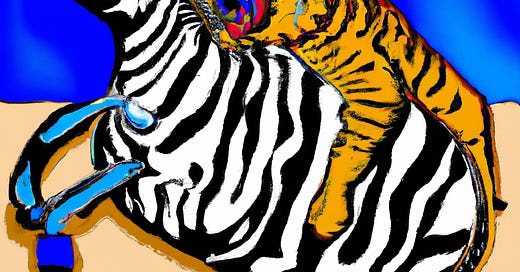Welcome to Sex and the State, a newsletter about human connection. To support my life’s work, upgrade to a paid subscription, buy a guide, follow me on OnlyFans, follow me on Twitter, support me on Patreon, or just share this post 🙏
~~~~~
I’m getting slightly obsessed with trauma right now.
Someone on Twitter was recently saying how they resent that everything goes back to trauma these days. And I thought, what if everything bad really does stem from trauma?
One reason trauma interests me is that it’s hard to concretely define. We say events are traumatic. But different people will experience the same event and one will experience it as traumatic and the other won’t.
I really liked the definition laid out in this article (8/10). “Trauma… can be defined as the protective response to overwhelm/adversity (an event or period of time that is too much, too fast, or too soon for us to handle), in which the unique window of tolerance in our autonomic nervous system is breached, and we get stuck in protect-mode,” Liam Farquhar writes.
I think this expansive definition of trauma is useful in part because let’s be real, people are having a hard time. As Liam writes, “Although we can acknowledge the global average is overall healthier, more democratic, less violent, and more educated than it’s ever been, this can create a false confidence. For we are also lonely, depressed, anxious, medicated, and addicted."
If trauma, as the DSM-5 claims, only happens in situations of physical violence, death threats, and/or sexual assault, why are depression and anxiety so common? Loneliness? Sure. But loneliness creates trauma.
And the cures on offer, antidepressants and conventional talk therapy, largely do not work.
So maybe we could benefit from looking closer at trauma.
What does it mean to be overwhelmed? It means we lose agency. An intense experience moves into overwhelming when I lose the ability to choose how to respond to it. Let’s say I’m calmly arguing with my boyfriend. Then I start to get angry. I start responding more quickly and with more venom. Then something comes out of my mouth that I immediately regret. I was overwhelmed.
Or take the time I was whitewater rafting (1/10) and I got smacked hard enough in the face with a paddle to push my tooth through my lip while the boat was flipping us all out and then got trapped under a waterfall and had to be rescued. In the rescue boat I couldn’t paddle. I just sat in the bottom and I remember someone in the boat said I was in shock and then I was like, Oh, I guess I’m in shock.
Were those events traumatic? That’s the trouble with trauma. Liam writes that a hallmark of trauma is getting “stuck in protect-mode.” Am I stuck in protect mode? Liam lists 30+ symptoms, including digestive problems, chronic pain, insomnia, and chronic fatigue. Check, check, check. These can show up immediately after the event or years later.
Here’s my hot take on trauma. Unless it’s ongoing and something I can leave, it doesn’t really matter what caused my trauma. Liam quotes Peter Levine, leading trauma expert and creator of Somatic Experiencing, “Trauma originates as a response in the nervous system, and does not originate in an event.”
According to what I’ve read, reliving the experience is not only unhelpful, but can actually be harmful. And it’s hella unpleasant besides. Plus, every time I recall a memory my brain changes it a little bit. So there’s just no way to know what really happened, unfortunately. And trying to figure it out isn’t super helpful. And I think at the end of the day it just doesn’t matter.
What matters is how I feel now.
To vastly oversimplify, I think integrating trauma is mostly letting my body feel the feelings and discharge the energy. I wrote recently about feeling my feelings so I’m not going to rehash that. But I want to explore the body part. Heh.
Basically, we need to shake it off. According to Liam, but I’ve read this before, when you see videos of mammals in life-threatening situations, you see that if they survive, they literally shake off their excess survival energy. Basically their sympathetic nervous system (gas pedal) gets floored when they’re in the crosshairs. Then to help their parasympathetic nervous system (brake) they shake and tremor.
Here’s a thing about me. When I don’t get at least 30 minutes of cardio that raises my heart rate most days, ideally every day, I get extra squirrely. My near-constant low-level insomnia and anxiety and depression become high-level.
Extra annoying is that I have arthritis in my hips. So running outside is a no-go. If I have hills I can get my heart rate high enough while walking.
I know this about myself. It’s been true since high school. And yet I can’t tell you how many times I’ve moved to places where there’s no gym or hills around or I haven’t wanted to pay for a gym and I’ve just been like, this is optional and then realized later when I’m exhausted and depressed and anxious AF that no, Cathy. This is not actually optional for you.
Anyway, reading about trauma I’m wondering if my cardio habit is just the closest I get to shaking it off.
I don’t know. I am not a particularly embodied person. Which is part of why somatic therapy modalities are so interesting to me. I think there’s a lot of promise there and I’m interested to learn more. Which means you’ll be learning more, my babies. Hope you’re liking it!
This is an ad! ⬇️ Click on it to support me!
700,000+ Guys read ELEVATOR every damn day
The best eye and brain candy curated from all corners of the web
No news. No politics. No BS.
Just the good stuff
100% Free







Freud seemed to think the human was created from trauma in a dialectical way. Infantile sexual impulses frustrated = trauma. Could be resolved by sublimation-- attraction to a parent giving way to being attracted to his or her type. Army basic training = traumatic. Resolve by turning into "super soldier." Freud was known to call humans a "disease."
I'm pretty convinced a very large chunk of the abusive behaviors we see perpetuated in society are trauma related.
I also would say that trauma I experienced led to a lack of personal embodiment and a very warped understanding of how and when to enforce personal boundaries. I know it also made drugs and alcohol quite attractive especially the delight in excessive indulgence and the camaraderie found in kindred spirits. Those who shared the appetite and fortitude to "keep it together" while aggressively self medicating. Took me a long time to realize that I was using these substances to escape self jusgement, anxiety and depression.
It's hard to know what anxiety is when you have only been anxious. My default was anxious hyper vigilance with a huge dollop of low self esteem.
I have a firm belief that effectively addressing existing trauma and minimizing or eliminating emergent trauma in the existing population will do more to move our civilization forward in a significant and noticeable way. Sadly this needs to be done for decades long stretches which makes me think it's unlikely.